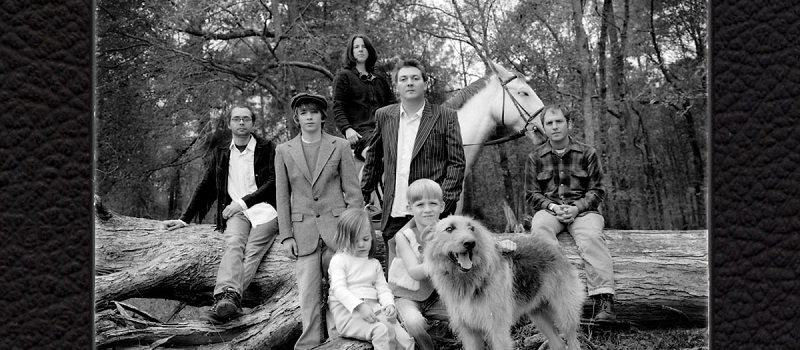You could probably try pressing and creasing and forcing and folding your frown into place while listening to Elf Power’s latest Orange Twin offering, but it wouldn’t do much good. Though the record”s title — Walking with the Beggar Boys — might call to mind tales of longing, loss and quietly resolved unity among the outcasts, the disc is the antithesis of somber reflection, a kind of sugar-tinged jolt of bright-eyed pop-rock in all its radio-ready AOR glory.
Does it work? Sure. The let’s-get-ready-to-roll, album-opener “Never Believe” is a pop gem, with pummeling drums and screeching lead guitar giving way to driving acoustic refrains and Andrew Rieger, who has one of the ideal pop-rock radio voices.
The song that follows it, the record’s title track, falls into a similar category, with a well-timed vocal assist from Vic Chesnutt just one of many contributions worth noting (the others: the occasional piano tickle, the multi-tracked early-chorus refrains).
Tracks like the shimmering, balladish “The Stranger,” the rock barn-burner “Don’t Let it Be,” and the incredibly noise-drenched indie exercise “The Cracks” round things out, lending the record some presence and depth.
Sadly, though, it’s the sheen and almost reflexive attentiveness to commercial accessibility that’s placed on a good handful of the songs that can make them sometimes fail or falter or seem weaker than they truly are.
Just when the lead guitar wails on the title track are walking straight into the sweet recesses of your memory, Elf Power walks into a ridiculously stereotypical rock guitar solo (you can nearly smell the hairspray) and a silly give-and-take vocal bridge (one measure, to the best I can hear: �”I was God / God is cool / God is you / God is me”) that nearly causes you to smirk and then skip to the next track.
For further examples, consider the danceable “Hole in My Shoe” and the closing “Big Thing,” both of which lose a touch of playfulness and care-free buoyancy when they step back for brief lead guitar lines placed way, way, way up in the mix.
It�s the moments between the quote-unquote pop radio songs that, I think, are the finest parts of Walking with the Beggar Boys. Instead of playing pop-rock by numbers, no matter how well or how colorfully, it’s on these songs where Elf Power hints at its own unique talents and can be vaguely reminiscent of the critically overlooked (and genre-bending) pop-scapes of Thin White Rope.
There are really a fair share of these moments: the guitar shuffle and careful picking that backs Rieger’s emotive delivery in “The Stranger;” the dissonant keyboard in a bridge of “Hole in My Shoe;” the choppy guitar and sugar-sweet Beatlesque choruses of “Evil Eye;” the quiet pockets of downtime in “Invisible Men.”
Then there’s “The Cracks.” Though it’s the least emblematic track of the outing, the song has a strange depth to it that goes beyond its three-minute running time.
With electronically assisted drums/percussion, noisy — and almost random — samples, grungy guitars, Haunted House keyboards from Laura Carter, and a paced but flowing lyricism from Rieger, it may be the best of the 11 tracks displayed here and, in the very least, easily the most original.
All in all, though, the strangest and most original moments are not at the heart of Walking with the Beggar Boys, a release that seems focused on hitting all the right notes at all the right times with all the right EQ. That may be a blessing for some and a let-down for others.
If the band didn’t hail from Athens, Ga., didn’t rub elbows with the likes of Elephant 6, and didn’t have some hefty expectations placed on it through a release on Orange Twin, maybe it would be easier to say that’s enough. – Delusions of Adequacy, July 2, 2004




